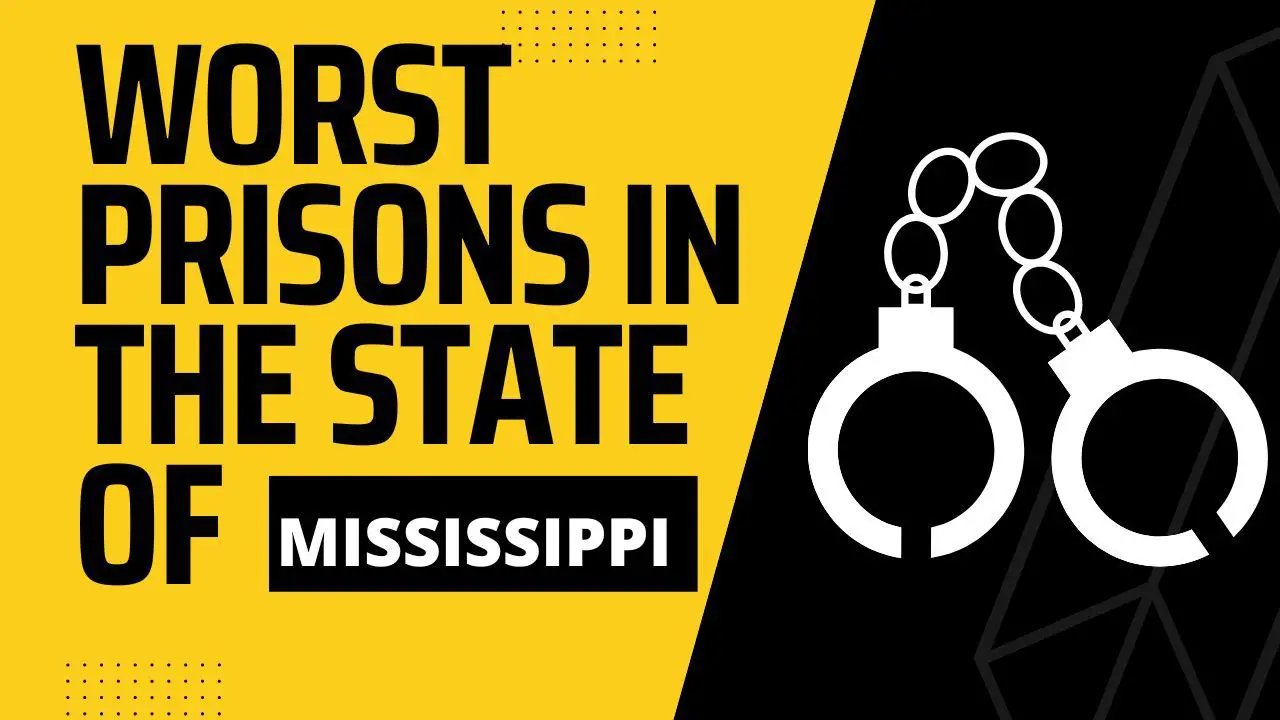10 Worst Prisons In The State of Mississippi
What are some of the worst prisons in the state of Mississippi? We have discussed some of the worst prisons in Mississippi based on the crime rate and living conditions of the prisoners.

Many famous musicians born in Mississippi, including B.B. King and Robert Johnson, are considered blues guitar gods. It is also recognized for its fertile soil, which contributes to the state's agricultural competitiveness, and catfish farming business.
But like every other state, Mississippi is known for some of the worst prisons in the United States. This post will discuss some of the worst prisons in Mississippi.
Why are Mississippi Prisons the Worst?
- Mississippi has a long and unfortunate history when it comes to its prisons. The state's prison system has been plagued by problems from conditions described as "inhumane" to a systemic culture of violence.
- They have been plagued by violence, neglect, and abuse for years.
- Prisoners sued many prisons due to racism and not providing basic facilities to the inmates.
- Mississippi Prisons are also charged with corruption cases from time to time.
Overview of Prisons in the State of Mississippi
According to recent reports, Mississippi has the second-highest incarceration rate in the United States. In 2017, there were nearly 23,000 people incarcerated in state prisons – an incarceration rate of 743 per 100,000 people.
Many small to medium security prisons in Mississippi are managed by the Mississippi Department of Corrections (MDOC). Many of these are adult prisons, while the others are juvenile facilities. The MDOC also manages several community correction centers and work centers, which provide housing and treatment for offenders nearing the end of their sentences. The majority of state prisoners in Mississippi are housed at Parchman Farm, which is also the oldest prison in the state. Today, Parchman Farmhouses around 4,200 inmates.
List of Prisons in the State of Mississippi
- East Mississippi Department of Corrections
- Wilkinson County Correctional Facility
- Marshall County Correctional Facility
- Walnut Grove Correctional Facility
- Mississippi State Penitentiary
- Central Mississippi Correctional Facility
- South Mississippi Correctional Institution
1. East Mississippi Correctional Facility
The East Mississippi Correctional Facility is a men's prison in Lauderdale County, Mississippi, near Meridian, about 90 miles east of Jackson. The special needs prison opened in 1999 and provides care for up to 1,500 prisoners with serious mental illness at all custody levels.
In May 2013, the ACLU (American Civil Liberties Union) and Southern Poverty Law Center filed a class action suit against the state of Mississippi and operators of EMCF because prisoners were being abused and conditions weren't improving. In addition, the United States Department of Justice (DOJ) investigated possible PREA audit violations and corruption among officials and contractors for the Mississippi prison system.
Mississippi Corrections Commissioner Christopher Epps resigned the day before he was indicted on corruption charges for bribery and taking kickbacks by the US Department of Justice (DOJ) in November 2014. Having served as commissioner since 2002,
2. Wilkinson County Correctional Facility
Wilkinson County Correctional Center is a private prison in unincorporated Wilkinson County, Mississippi. It has been managed by Management and Training Corporation since July 2013 on a five-year contract with the Mississippi Department of Corrections.
The Federal Transfer Center became operational in November 2015 as a low- to medium-security prison converted to a maximum-security facility. The institution's authorized capacity is 900 people.
Wilkinson County Correctional Facility is a private prison that houses some of Mississippi's most dangerous criminals. The prison has been plagued by violence, overcrowding, and poor living conditions. There have also been corruption cases against the commissioner of the prison.
Demond Flowers was stabbed in the heart by members of the Gangster Disciples and Vice Lords on April 20, 2013. Following a gang fight, prison officials had ended a lockdown the day before. The family of Demond Flowers sued CCA for an undisclosed sum after the attack.
Commissioner Charles Epps resigned from the MDOC on November 7, 2014. The next day, he and consultant and former state legislator Cecil McCrory were indicted by the US Attorney of the Southern District of Mississippi on 49 counts of bribery and kickbacks in connection with contracts that Epps oversaw.
3. Marshall County Correctional Facility
The Marshall County Correctional Facility is a for-profit prison that MTC manages on behalf of the Mississippi Department of Corrections. The facility is located in Holly Springs, in Marshall County, Mississippi.
The minimum/medium-security prison facility has a capacity of 1,076 individuals and is located on 17 acres (6.9 ha) of enclosed space. The Marshall County Correctional Facility is one of three privately operated prisons for the state as of March 2017.
Marshall County Correctional Facility has been beset by violence, overcrowding, and poor living conditions. Inmates have reported being forced to live in cells infested with vermin, with little to no access to necessities like food and water.
In 2010, the ACLU and the Southern Poverty Law Center sued GEO Group and the Mississippi Department of Corrections over prisoner maltreatment and facility failure at Walnut Grove Youth Correctional Facility. Due to this case's resolution, the state was compelled to fire GEO Group and re-advertise for a new management firm.
4. Walnut Grove Correctional Facility
The Walnut Grove Correctional Facility is a former state-owned prison operated as a for-profit in Walnut Grove, Mississippi, from 1996 to 2016. It was constructed in 1990 and held male youth offenders. It was expanded in 2001. The capacity for prisoners eventually reached 1,469, making it the largest juvenile facility at the time in the country.
The FBI investigated its contracts for operation and services during its lengthy investigation involving corruption, famously known as Operation Mississippi Hustle. Walnut Grove has been plagued by problems since it opened, including allegations of widespread abuse and mistreatment of prisoners by guards and inadequate medical care.
The Justice Department Civil Rights Division's March 20, 2012 report found that conditions at WGCF were "among the worst we have seen in any facility anywhere in the nation." The poorest living and healthcare conditions, as well as having guards with criminal affiliations, allow for little to no safety for young inmates
5. Mississippi State Penitentiary
The Mississippi State Penitentiary, also known as Parchman Farm, is a maximum-security prison farm located in unincorporated Sunflower County, Mississippi. It occupies about 28 square miles (73 km2) of land and is the state's oldest prison.
In 1961, Freedom Riders took a stand against segregation in the American South by protesting at public facilities that served interstate transportation. At this time, segregation of these facilities and buses was declared unconstitutional, but the federal government had done nothing to enforce the Supreme Court decisions. Southern states were openly ignoring these rulings.
In 1970, civil rights lawyer Roy Haber began taking statements from inmates detailing the abuses they endured at Parchman, including murders, rapes, beatings, and more. These statements eventually amassed 50 pages of evidence. In 1972, four Parchman inmates took legal action against the prison superintendent in federal district court for violating their constitutional right not to be subjected to cruel and unusual punishment.
6. Central Mississippi Correctional Facility
The Central Mississippi Correctional Facility for Women (CMCF) is a state prison holding male and female prisoners. It is located in an unincorporated area in Rankin County, Mississippi, near the city of Pearl.
The 171-acre (69 ha) prison is the only state prison to hold female prisoners in Mississippi, in addition to minimum and medium security male offenders. As such, it operates as the female death row of the state.
CMCF opened its doors in January 1986 with room for 667 inmates. It was the first prison away from Mississippi State Penitentiary (MSP) that the Mississippi Department of Corrections oversaw.
The prison has a capacity of 3,000 inmates, but it often holds more than that. The prison is overcrowded, and the conditions are deplorable. The inmates are often held in cells so small they can barely move. The cells are filthy, and the inmates are not given enough food or water.
The prison is also dangerous. There have been multiple riots, and the inmates have been known to attack guards. The prison is also understaffed, and the guards are often overworked.
7. South Mississippi Correctional Institution
SMCI is a state prison for men in unincorporated Greene County, Mississippi. The facility has 360 acres of land and is located near Leakesville. In April 1989, the dedication ceremonies were planned to begin on April 17, and the initial 25 inmates were expected to arrive on that date. The prison opened on April 13, 1990, with 516 prisoners. Dale & Associates was responsible for the design of the facility.
In the late 2010s, SMCI was beset with severe budget cuts, a lack of enforcement officer personnel, and adverse circumstances that put staff and prisoners at risk. An analysis by the state Attorney General's office into the escape of an offender named Michael Wilson in July 2018 revealed that SMCI was restricted from communicating or synchronizing with other agencies, putting public safety at risk.
You can also read articles related to this topic;
- 10 Worst Prisons In The State of Idaho
- 10 Worst Prisons in the State of Virginia
- The 10 Worst Prisons In The State of Oregon
- 10 Worst Prisons In The State of New Hampshire
- 10 Worst Prisons in the State of Oklahoma
- 7 Worst Prisons in The State of Utah
- 6 Worst Prisons In The State of Hawaii
- 6 Worst Prisons In The State Of Alaska
- 10 Worst Prisons In The State of Montana
- 7 Worst Prisons In The State Of New Mexico
